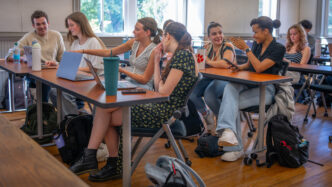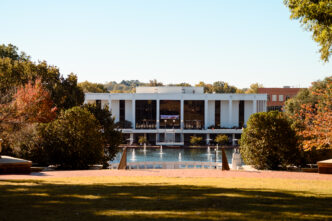Clemson University is renowned for its groundbreaking research, cutting-edge engineering programs, agricultural outreach initiatives, rich military history and winning athletic programs. Less known, but no less notable, it also has a robust pre-law program.
Pre-law, housed in the College of Arts and Humanities, isn’t just a hidden gem among premier academic offerings statewide. It’s unique within Clemson’s long roster of academic programs in that it’s available to students in any major.
Undergraduates in political science, criminal justice and business go through the program regularly, but so do students pursuing degrees in history, economics, English and architecture. Students majoring in philosophy can choose a law, liberty and justice concentration, which saw an 80 percent growth in enrollment from 2020 to 2024.
Law touches almost every conceivable vocation. Patent law, for instance, has broad applications for individuals seeking degrees in fields ranging from business to packaging science.
“There’s no one academic track in applying to law school. It’s more of a life plan than a major,” says pre-law advisor and lecturer in pre-law studies Cary Berkeley Kaye, J.D. “There are innumerable classes that are law-related or law-adjacent in almost every department at Clemson.”

A signature of Clemson’s pre-law program is the William Howell Pre-Law Society, the University’s primary student organization for learning about law school and legal careers, named after Judge William “Bill” Tindall Howell, a 1964 Clemson graduate and former Chief Judge of the South Carolina Court of Appeals. In addition to its mission to further educate Clemson students about the degree of dedication required to apply to law school and prepare them for the LSAT, the group provides a platform for aspiring pre-law students to interact and foster relationships. The group’s membership is approaching 500.
Jurist in Residence
In 2024, 182 Clemson graduates were accepted to law schools. Clemson alums are well represented at the University of South Carolina’s law school, but many have gone on to attend schools such as Harvard, Princeton, Yale and Stanford.
“Clemson is a great place to study and therefore a great place to do pre-law,” says Kaye, who earned her undergraduate degree from Harvard, her law degree from Yale and did a fellowship at Cambridge in between.
“It has a good reputation among law schools, and that matters when they’re evaluating your standardized GPA and everything else,” Kaye says. “If you want to pursue a career in law, this is a place that welcomes that and offers resources to support you. You can go on to have a great legal career from Clemson, and many have done just that.”
Last year, Clemson’s pre-law program received an asset that will boost its desirability rating even higher among prospective students: Judge Gary Clary, former circuit judge and 1970 Clemson graduate, accepted the position of Clemson’s Jurist in Residence, making Clemson only the second university in the country without a law school to secure someone in that position.

Clary has had an extraordinary career as a lawyer, judge and statehouse representative. Most recently, he has presided over the Clemson University Municipal Court, which provides bench and jury trials for traffic and criminal cases that happen inside the University boundaries. When Clary was asked to take over the court in 2021, it had a backlog of 450 cases. He was able to clear the docket with the help of associate judge Lindsey Simmons and was planning to retire and “play golf and travel a little bit” when Clemson’s chief financial officer, Rick Patillo, convinced him to stay on for a little while longer.
“He said, ‘Well, you gonna work?’” recalls Clary. “I said, sure, I’m always going to work. He said, ‘Well, we’re not going to let you leave.’”
Clary served in that position for another four years until this past June, when special advisor to the Board of Trustees and general counsel Chip Hood reached out to Clary with another offer he couldn’t refuse.
Hood explained that President Clements was creating a new position, the University’s first jurist in residence, and wanted Clary to fill it.
“The next thing you know, I’m coming back to work yet again,” Clary laughs. “I love the job. The students are great. This new role fits well with the Criminal Justice course [JUST4990] that I teach each fall on The Death Penalty, I bring in a lot of guest speakers who have real-world experience in the area and who have worked with me, are my friends, and are willing to come here. Tomorrow, I have a forensic psychiatrist coming in that’s worked on death row litigation for 30-plus years.”
As Jurist in Residence, Clary’s primary job will be to bring in notable law professionals for speaking and mentoring engagements with the students. Clary, who has tried nine death penalty cases, also teaches a class on the death penalty that he still instructs in the fall, and he takes particular joy in mentoring students using his decades of experience at the highest levels of the judiciary.
What to expect
Students in Clemson’s pre-law program can expect an intellectually challenging schedule designed to ready them for the LSAT test and the rigors of earning a law degree, which is a three-year graduate program at institutions that offer them.
The curriculum includes many chances for students to cut their teeth in mock trials and moot courts, which can get quite competitive, says Kaye. nd anyone can come watch them.

“The moot court and the mock trial teams are very good pre-law opportunities,” Kaye says. “Mock trial is a simulated trial with witnesses, an opening statement and a closing argument, as if there were a jury there. It’s very widely done in high schools, so a lot of students come in with experience of it. Moot court is simulated argument of the kind that people make in front of the Supreme Court. It’s arguing about the legal implications of a case that’s already been developed at a lower level. Those two things are both available for Clemson students to represent Clemson in competition and come and learn the skills and try out some law directly.”
Last year, Clemson’s mock trial team placed second in an invitational tournament, and the moot court team made it to pre-nationals. The teams are based in the Department of Philosophy and Religion and are open to all students.
The servant mindset
Kaye has no problem listing a few notable pre-law alumni who went on to distinguished careers.
“Judge Joe Anderson and Judge Mary Geiger Lewis are federal judges in Columbia, Judge Donald Coggins is a federal judge in Spartanburg, Judge Daniel Coble is a state judge in Columbia – these are all people who come to mind easily. They all became judges, and they’re all Clemson alumni.”
Clary says one piece of advice he gives to students considering a pre-law career is that a law degree can be valuable even if you never practice law.
“It gives you the flexibility to move into different areas, which is what I did after I retired as a judge,” Clary explains.
After stepping off the bench, Clary went to work with an extended-stay hotel company as their assistant general counsel, in charge of outside litigation, among other responsibilities. He says the company owner hired him because he noticed the diversity in his career.

“He said, Judge, I look at your resume and see you reinvented yourself about every 10 years. I said, ‘I wish I could say that I intentionally did that, but I get bored and I need a new challenge, so I look to do something else.’ And within the law, I was able to shift into different parts of it, which has been great.”
Clary says his main takeaway from his life as a lawyer is that it always involves some form of community or public service.
“When I look back on my career and all the things that I’ve done, even though I was in private practice for almost 18 years, I was always involved in some kind of public service,” he says.
“I’m getting close to 40 years in public service through all the different things that I’ve done, and I think that is really the hallmark and the calling card of someone who enters the law with the right mindset,” Clary says. “You’re going to be a public servant, whether you get into politics, serve on local boards, or whatever you do. You will spend your life giving back to your community.”








